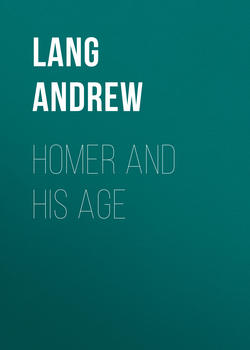Читать книгу Homer and His Age - Lang Andrew, May Kendall - Страница 6
CHAPTER V
ОглавлениеAGAMEMNON IN THE LATER "ILIAD"
In the Third Book, Agamemnon receives the compliments due to his supremacy, aspect, and valour from the lips of Helen and Priam. There are other warriors taller by a head, and Odysseus was shorter than he by a head, so Agamemnon was a man of middle stature. He is "beautiful and royal" of aspect; "a good king and a mighty spearman," says Helen.
The interrupted duel between Menelaus and Paris follows, and then the treacherous wounding of Menelaus by Pandarus. One of Agamemnon's most sympathetic characteristics is his intense love of his brother, for whose sake he has made the war. He shudders on seeing the arrow wound, but consoles Menelaus by the certainty that Troy will fall, for the Trojans have broken the solemn oath of truce. Zeus "doth fulfil at last, and men make dear amends." But with characteristic inconsistency he discourages Menelaus by a picture of many a proud Trojan leaping on his tomb, while the host will return home-an idea constantly present to Agamemnon's mind. He is always the first to propose flight, though he will "return with shame" to Mycenae. Menelaus is of much better cheer: "Be of good courage, {blank space} ALL THE HOST OF THE {misprint}" – a thing which Agamemnon does habitually, though he is not a personal poltroon. As Menelaus has only a slight flesh wound after all, and as the Trojans are doomed men, Agamemnon is now "eager for glorious battle." He encourages the princes, but, of all men, rebukes Odysseus as "last at a fray and first at a feast": such is his insolence, for which men detest him.
